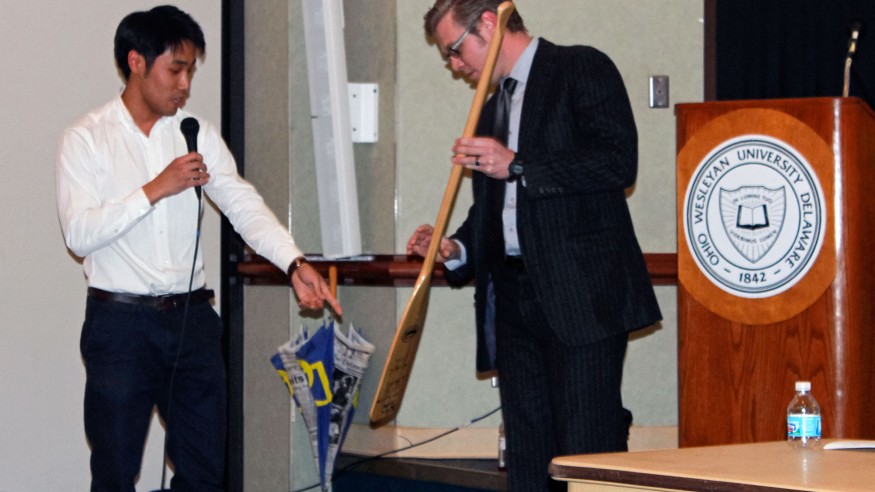
An Apocalyptic Debate
Andrew Paik ’14 (left) presents professor Goran Skosples with an oar symbolizing that Skosples won a spot in the life raft. (Photo by Katie Nunner ’16)
It was a fight to the death! Or rather, a fight to the life…raft.
This year, the Ohio Wesleyan Honors Board brought back an event from the past, the Life Raft Debate. With the exception of the 2012-2013 school year, the Honors Board has hosted this clash of academic departments since 2002.
In this debate, professors from various departments defend their department’s value in recreating civilization after a watery apocalypse.
This year’s debate pitted the politics and government, philosophy, economics, humanities, zoology, fine arts, and classics departments against one another. Each of the professors proclaimed the advantages of their departments, trying to earn the only available seat on a life raft.
Economic professor Goran Skosples, the victor, received a wooden oar, symbolic of his place on the life raft.
Before his victory came a vigorous debate, with each professor speedily listing defenses for a department before the allotted time ran out. Professors used PowerPoint presentations and rhetoric to keep audience members laughing — while trying to win them over.
“I really appreciated how excited the professors got and how much thought they put into it,” says Andrew Paik ’14, Honors Program coordinator.
From promoting their departments to pointing out the flaws of other departments, the professors made strong cases to save their departments.
“Each professor had good parts to their speech that I really enjoyed and got something from,” says Olivia “Livvy” Coseriu ’15, a permanent member of the Honors Board.
Professor Ashley Biser from politics and government created a campaign against her fellow professors. She collected pictures of her opponents and pointed out their incompatibility with a post-apocalyptic world. She noted that some of the art studied by professor Janalee Emmer must be stored in a climate-controlled environment, which would not be possible in the apocalypse.
“Biser…kind of did a satire of politicians and how they would run a campaign,” Coseriu says.
Emmer, the representative for the fine arts, proclaimed the importance of art in creating a new society worth surviving the apocalypse for.
In defending his department, professor Erin Flynn insisted that philosophy was necessary to help the new society choose good values.
Skosples argued the other departments relied on the decision-making elements of economics, making his department the best choice.
“His dynamic debate stuff kind of showed up,” Paik says.
Meanwhile, zoology professor Shala Hankison consistently reminded the audience that she was the only professor with the skills necessary to help provide food.
Professor Sally Livingston took a slightly different approach. She referenced literary examples of apocalyptic situations, including Fahrenheit 451, in which Harvard graduates, like herself, help save books. Livingston suggested that as a humanities professor, she was equipped to handle various apocalyptic problems because literature has previously posed each situation.
The classics department representative, professor Lee Fratantuono, spoke last before the rebuttals. He acted as the devil’s advocate, arguing that none of the other departments was as qualified as the classics department.
“I really enjoyed how the professors enjoyed it as much as the students did,” Paik says.
The large attendance also magnified the excitement of the event.
“[It was] one of the more successful ones. It definitely had more attendance from diverse groups of people,” Coseriu says.
The event’s humor as well as the enthusiasm of the professors indicates a continued life for this event.
“In the past I didn’t think I would be interested in planning another Life Raft Debate…but now I am definitely interested in planning another one,” Coseriu says.
